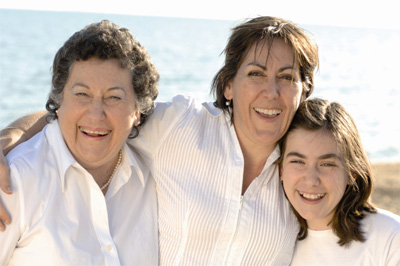Endometriosis and fertility

Endometriosis and fertility
Kathryn, 29, had recently been diagnosed with endometriosis. Not knowing much about the condition, she started asking her friends and co-workers if they knew anything about it. One woman said her sister had endometriosis and was infertile. Kathryn had always wanted children one day and was devastated to think that this was no longer possible.
Endometriosis affects up to 10 per cent of women of child-bearing age. It is a condition where endometrial tissue, which normally lines the uterus, grows outside the uterus by mistake and attaches to other tissues or organs. Symptoms of endometriosis include heavy, painful or irregular periods, abdominal, back or pelvic pain, bowel or bladder problems, and premenstrual symptoms. For some women, the most distressing symptom is reduced fertility - having endometriosis can make it difficult to get pregnant.
Some newly diagnosed women may worry that they may never have children. This is not necessarily true - only 30 per cent of women with endometriosis experience fertility problems. In these cases, having the endometrial tissue removed surgically via a laparoscopy can increase the chances of falling pregnant naturally. If surgery is unsuccessful, in vitro fertilisation (IVF) can be an option, however it is important that the endometriosis is properly treated first as IVF treatments can aggravate the condition.
The good news is that women with endometriosis who do become pregnant often report that their symptoms are alleviated during pregnancy as they are no longer menstruating. Unfortunately, the effect is usually temporary and symptoms will often reoccur after the baby is born and periods return. Hormonal therapies (such as the Pill) may be used as a maintenance treatment option after pregnancy however this is not suitable for women trying to conceive.
If you have endometriosis or experience the symptoms of endometriosis, see your health practitioner for advice about appropriate treatment options.
8-12 March is Endometriosis Awareness Week. For more information about endometriosis, visit www.endometriosis.org.au
Published with the permission of the Jean Hailes Foundation for Women's Health
Tollfree number 1800 151 441 for women seeking further health information www.jeanhailes.org.au
Endometriosis affects up to 10 per cent of women of child-bearing age. It is a condition where endometrial tissue, which normally lines the uterus, grows outside the uterus by mistake and attaches to other tissues or organs. Symptoms of endometriosis include heavy, painful or irregular periods, abdominal, back or pelvic pain, bowel or bladder problems, and premenstrual symptoms. For some women, the most distressing symptom is reduced fertility - having endometriosis can make it difficult to get pregnant.
Some newly diagnosed women may worry that they may never have children. This is not necessarily true - only 30 per cent of women with endometriosis experience fertility problems. In these cases, having the endometrial tissue removed surgically via a laparoscopy can increase the chances of falling pregnant naturally. If surgery is unsuccessful, in vitro fertilisation (IVF) can be an option, however it is important that the endometriosis is properly treated first as IVF treatments can aggravate the condition.
The good news is that women with endometriosis who do become pregnant often report that their symptoms are alleviated during pregnancy as they are no longer menstruating. Unfortunately, the effect is usually temporary and symptoms will often reoccur after the baby is born and periods return. Hormonal therapies (such as the Pill) may be used as a maintenance treatment option after pregnancy however this is not suitable for women trying to conceive.
If you have endometriosis or experience the symptoms of endometriosis, see your health practitioner for advice about appropriate treatment options.
8-12 March is Endometriosis Awareness Week. For more information about endometriosis, visit www.endometriosis.org.au
Published with the permission of the Jean Hailes Foundation for Women's Health
Tollfree number 1800 151 441 for women seeking further health information www.jeanhailes.org.au
MORE
- Breast Augmentation Thailand
- Menstrual Period Management
- The Secret to Weight Loss
- Feeling The Pain: How To Tackle Period Pain
- Period Pain and How to Survive It
- Gender Specific Medicine
- Helping Women To Start Those 'Difficult'...
- Michelle Boyd Ellura Interview
- Menopause Does Not Protect Women From Cervical...
- Five Ways to Balance Hormones
- Do You Really Know What Is Going On Down There?
- Do You Know Your Breasts?
- Dr. Stan Goldstein Sexual Health Choices Interview
- Breast Health Decision Question and Answers
- Breast Cancer Treatment Impacts Patients' Sex...
- Bladder Weakness More Common Than Hay Fever
- Belinda Reynolds How To Manage UTI's Naturally...
- Treat Bones Like Breasts
- Mammogram Technology
- Soodox for Women
- Chlamydia Most Commonly Reported STI In Australia



